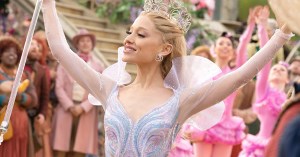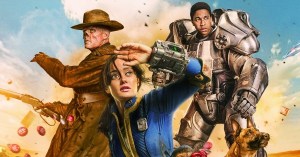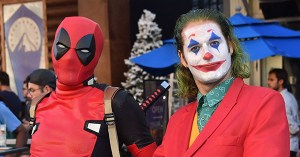Johnny Depp’s Best Movies
We count down the best-reviewed work of the Transcendence star.
He once seemed destined for nothing better or worse than simple teen idolhood, but since escaping from 21 Jump Street in 1990, Johnny Depp has proven himself to be a brave (and mostly pretty astute) chooser of scripts, building an impressive filmography that encompasses everything from black-and-white arthouse fare (Dead Man) to blockbuster Disney trilogies (Pirates of the Caribbean). This weekend, he returns to theaters in Transcendence as a scientist who has his consciousness uploaded to the cloud, so we thought now would be a fine time to devote a fresh installment of Total Recall to counting down the 10 best-reviewed releases of Depp’s 30-year (and counting) film career.
10. Tim Burton’s Corpse Bride
Twelve years after producing Henry Selick for The Nightmare Before Christmas, Tim Burton returned to stop-motion animation with Corpse Bride, a collaboration with co-director Mike Johnson. Starring Depp as the voice of Victor Van Dort, a skittish young fishmongers’ son who finds himself accidentally wed to an undead hottie (Helena Bonham Carter), Bride used a Jewish folktale for it’s story’s inspiration, but visually, it offered a sort of hybrid between Nightmare and Beetlejuice, with all the stylish flair and sweet melancholy that filmgoers had come to expect from a Tim Burton production. Though Bride didn’t exert the level of box office dominance enjoyed by 2005’s other Burton/Depp project, Charlie and the Chocolate Factory, it still grossed over $100 million worldwide — and earned the admiration of critics like the Philadelphia Inquirer’s Steven Rea, who gushed, “Tim Burton’s Corpse Bride is easily the best stop-motion animated necrophiliac musical romantic comedy of all time. It is also just simply, wonderful: a morbid, merry tale of true love that dazzles the eyes and delights the soul.”
9. Finding Neverland
Sticklers for accuracy bristled at the liberties it took with J.M. Barrie’s life story, but Finding Neverland was still good enough for audiences — who made it a $100 million-plus hit — and the Academy, which bestowed Johnny Depp with a Best Actor nomination for his work as the playwright and Peter Pan author. Neverland finds Barrie nursing his wounds after the failure of his most recent play, befriending a widow (Kate Winslet) and her young boys, and taking inspiration from their unorthodox friendship — even as it costs him his own marriage and puts him at odds with the boys’ grandmother (Julie Christie). “Plenty of narrative liberties have been taken,” admitted Jason Blake of the Sydney Morning Herald, who then argued that “It doesn’t matter a jot. At heart, this isn’t a biography anyway, it’s an ode to the power of the imagination.”
8. Arizona Dream
Filmed in 1991, Emir Kusturica’s Arizona Dream languished in limbo for two years before it was released in Europe — and it didn’t reach American shores until the following September, at which point it grossed a little over $100,000 in limited release. It seems like a pretty harsh fate for a movie featuring Johnny Depp, Jerry Lewis, and Faye Dunaway, but if you’ve ever seen Dream, you know it is not, to put it mildly, the type of film Hollywood studios were made to promote. The story of a fish tagger (Depp) who believes he can see the fishes’ dreams, it’s over two hours of absurdist comedy, packed with symbolism-laden dream sequences and oddball characters like Grace, the turtle-obsessed young woman played by Lili Taylor. Even the critics that enjoyed it used words like “peculiar,” “odd,” and “bizarre” to describe Dream; as Janet Maslin of the New York Times wrote, “Even at its full length, showing off a more seductive rhythm and the buoyant humanism that is this director’s calling card, it remains as ripe a subject for therapy as for criticism.”
7. Sweeney Todd: The Demon Barber of Fleet Street
More than 15 years after lip-synching to the voice of James Intveld in Cry-Baby, Johnny Depp returned to the world of cinematic musicals — and marked his sixth collaboration with Tim Burton — for 2007’s Sweeney Todd: The Demon Barber of Fleet Street, an appropriately bloody adaptation of the Sondheim play about a Victorian barber whose unjust imprisonment sparks a murderous (and ultimately tragic) quest for revenge. This time around, however, Depp did his own singing — and acquitted himself rather admirably, surprising critics who expected a Return of Bruno-sized embarrassment from another actor trying to get by with a few vocal lessons and a ton of chutzpah. On the acting front, the critical hosannas afforded Sweeney Todd‘s cast — which included a gleefully deranged Helena Bonham Carter and Alan Rickman as another of the deliciously grotesque villains he plays so well — were less unexpected; at this point, critics had come to expect a certain level of quality from Depp and Burton’s collaborations, and for the most part, they came away satisfied. As Roger Ebert summed it up in his review, “it combines some of Tim Burton’s favorite elements: The fantastic, the ghoulish, the bizarre, the unspeakable, the romantic and in Johnny Depp, he has an actor he has worked with since Edward Scissorhands and finds a perfect instrument.”
6. Donnie Brasco
The mid-to-late 1990s were an uneven period for Depp; although he scored a medium-sized hit at the box office with 1995’s Don Juan De Marco, it isn’t one of his best-reviewed performances (and it allowed Bryan Adams back into the Top 40, too). Other releases during this period ranged from the willfully non-commercial (1995’s Dead Man) to the just plain unpopular (Nick of Time, released the same year). 1997’s Donnie Brasco, a dramatization of the FBI’s late ’70s investigation into the Bonanno crime syndicate, wasn’t an enormous hit, but it earned respectable grosses — and more importantly, it allowed Depp to work with a director (Mike Newell) and legendary co-star (Al Pacino) who brought out the best in him. Depp plays Joe Pistone, the FBI agent assigned to infiltrate the Bonanno gang by pretending to be a diamond expert named Donnie Brasco and ingratiating himself to a low-level foot soldier named Lefty Ruggiero (Pacino); since Pistone’s situation (as well as Paul Attanasio’s script) keeps much of his true self hidden beneath the surface, the part required an actor capable of communicating very subtly, and Depp rose to the occasion. His between-the-lines performance was matched by Pacino, who dialed back the high-volume bluster he’d become known for, earning the pair praise from critics like the Houston Chronicle’s Jeff Millar, who wrote, “Depp is as good as I’ve seen him, and Pacino is simply astonishing.”
5. Rango
When director Gore Verbinski ventured into uncharted territory for his animated debut, he brought along familiar company: Johnny Depp, who starred in the first three Pirates of the Caribbean movies with Verbinski at the helm (and continued the franchise without him the same year, toplining the decidedly less Tomatometer-friendly On Stranger Tides for new director Rob Marshall). The duo combined Verbinski’s box office instincts with Depp’s love of the strange for Rango, a delightfully off-kilter cartoon about a pet chameleon who ends up stranded in the desert and bumbles his way into being appointed sheriff of a town under siege by a vicious rattlesnake (voiced by Bill Nighy). Although a handful of critics were put off by Rango‘s surreal overtones and adult humor, audiences approved to the tune of a $245 million worldwide gross, the Academy awarded it Best Animated Feature at the Oscars, and the vast majority of writers echoed the sentiments of the New Yorker’s Bruce Diones, who said it was “built for viewers of any age with a taste for joyful anarchy.”
4. What’s Eating Gilbert Grape
Not counting the delayed Arizona Dream, Johnny Depp released two movies in 1993, both of them handling themes of mental illness with a relatively gentle touch. Of the pair, Benny & Joon arrived in theaters first, but it was What’s Eating Gilbert Grape that ultimately held a firmer grip on critics’ hearts, earning an 89 percent Tomatometer rating and an Academy Award nomination for Leonardo DiCaprio, who laid the groundwork for his post-Growing Pains future with a breakout performance as the mentally handicapped younger brother of the small-town grocery clerk whose inner conflicts are reflected in the title. Torn between familial obligations and a need to establish a life of his own, Gilbert gave Depp another opportunity to perfect the “sensitive misfit” archetype he’d been drawn back to repeatedly since making Edward Scissorhands. It was a type of role he’d soon branch out from, but in the meantime, Gilbert Grape entranced critics like Susan Tavernetti, who wrote, “with an eccentric charm that falters only in a few places, the movie makes a strong statement against conformity and the franchising of America by celebrating a cast of characters and a storyline that don’t fit into a mold.”
3. Edward Scissorhands
21 Jump Street made Johnny Depp a household name, but heck, the show did the same thing for Richard Grieco; to become a star, Depp needed to carry a film that really got people talking — and he found that film in Edward Scissorhands, the December 1990 release that was the first of what would become many collaborations with director Tim Burton. He’d been in a handful of movies already, but Scissorhands was the one that really launched Depp’s career; in fact, he embodied the role of the titular blade-fisted misfit so thoroughly that it’s difficult to imagine how it could have been pulled off by any of the actors previously floated for it — a list including famous names such as Robert Downey, Jr., William Hurt, Tom Cruise, and Michael Jackson. A critical as well as commercial hit, Edward Scissorhands set the tone for much of what was to come from both Burton and Depp, and won high marks from writers like the Washington Post’s Desson Thomson, who noted, “Depp is perfectly cast, Burton builds a surrealistically funny cul-de-sac world, and there are some very funny performances from grownups Dianne Wiest, Kathy Baker and Alan Arkin.”
2. Ed Wood
These days, you almost can’t be an outsider artist of any real renown without having at least one reverent documentary to your name, but in the early 1990s, it would not have been unreasonable to assume that any biopic about Ed Wood — director of Plan 9 from Outer Space and other classics of unintentional humor — would arrive on the screen drenched in irony and coated in arch wit. Not so 1994’s Ed Wood, a loving tribute rendered by the hand of Tim Burton, whose reunion here with Johnny Depp helped the Edward Scissorhands star get over a boredom with acting that had begun to seep into his work. Burton’s version of Wood didn’t hew religiously close to the reported facts of the director’s life — and neither did the black-and-white production entice many filmgoers, racking up an appropriately Wood-sized $5.9 million gross — but critics appreciated the silver lining Burton saw in a frequently derided career, not to mention the relentless (albeit blind) optimism with which the director and star imbued their subject. Rolling Stone’s Peter Travers echoed the opinions of a majority of his peers when he wrote, “outrageously disjointed and just as outrageously entertaining, the picture stands as a successful outsider’s tribute to a failed kindred spirit.”
1. A Nightmare on Elm Street
Before he broke hearts as Tom Hanson on 21 Jump Street, Johnny Depp was one of Freddy Krueger’s original victims, getting his first big break as Glen Lantz, the well-meaning but ultimately doomed boyfriend who tries to save Nancy Thompson (Heather Langenkamp) from the steel-tipped clutches of Springwood’s least favorite resident. He was one of a handful of actors (including Kevin Bacon and Crispin Glover) to get a leg up in the ’80s by taking an early paycheck for enduring a grisly on-screen demise, but Depp’s Nightmare exit was particularly gruesome, ending with his perfect hair and cheekbones crushed into a horrific fountain of blood and guts. A Nightmare on Elm Street‘s legacy has been tainted somewhat by the downward spiral of sequels that followed it, but at the time, it was really a breath of fresh air for a genre that desperately needed one — something Depp tacitly alluded to when he made a blink-and-you’ll-miss-it cameo in 1991’s alleged series-ender, Freddy’s Dead: The Final Nightmare. Despite subsequent installments’ inability to recapture its gory glory, the first Nightmare, in the words of ReelViews’ James Berardinelli, “still stands on its own as an intriguing and chilling example of how horror works best when the characters and the audience don’t have to be lobotomized.”
In case you were wondering, here are Depp’s top 10 movies according RT users’ scores:
1. Edward Scissorhands — 91%
2. Fear and Loathing in Las Vegas — 90%
3. What’s Eating Gilbert Grape — 89%
4. Donnie Brasco — 89%
5. Ed Wood — 88%
6. Dead Man — 88%
7. Finding Neverland — 87%
8. Blow — 87%
9. Arizona Dream — 87%
10. Pirates of the Caribbean: The Curse of the Black Pearl — 86%
Take a look through Depp’s complete filmography, as well as the rest of our Total Recall archives. And don’t forget to check out the reviews for Transcendence.






